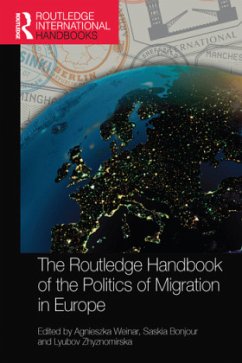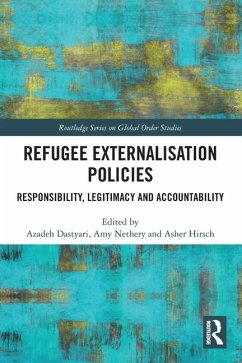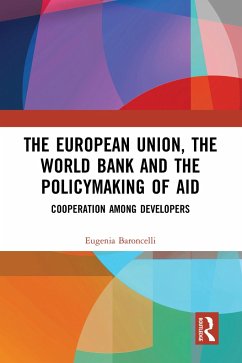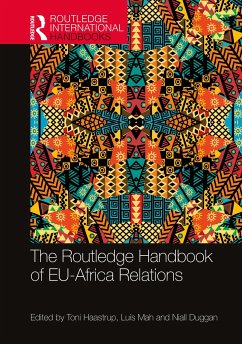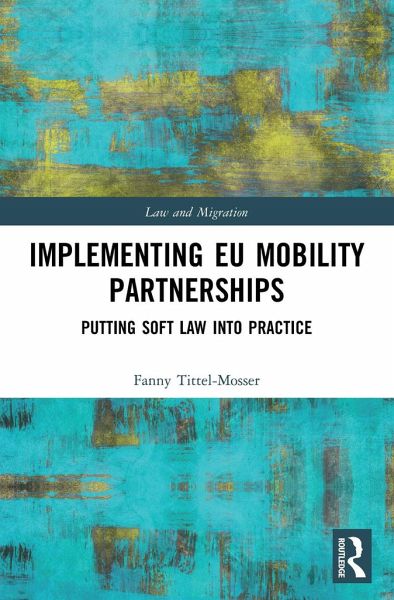
Implementing EU Mobility Partnerships
Putting Soft Law into Practice
Versandkostenfrei!
Versandfertig in 6-10 Tagen
45,99 €
inkl. MwSt.
Weitere Ausgaben:

PAYBACK Punkte
23 °P sammeln!
This book provides a comprehensive assessment of the effectiveness of Mobility Partnerships and their consequences for third countries.Mobility partnerships between the EU and third countries are usually viewed as reflecting asymmetric power relations where development aid, trade relations and visa policies are made conditional upon the cooperation by third countries with an EU agenda of migration control. This book argues that three main factors condition the relevance of Mobility Partnerships: the state of relations between EU Member States and a third country, and in particular, the role of...
This book provides a comprehensive assessment of the effectiveness of Mobility Partnerships and their consequences for third countries.
Mobility partnerships between the EU and third countries are usually viewed as reflecting asymmetric power relations where development aid, trade relations and visa policies are made conditional upon the cooperation by third countries with an EU agenda of migration control. This book argues that three main factors condition the relevance of Mobility Partnerships: the state of relations between EU Member States and a third country, and in particular, the role of postcolonial ties; the power of negotiation of a third country, which is linked to its geopolitical importance for the EU; and its administrative capacity, which is understood as the capacity of a state to define and implement policies and to legislate and enforce the law. The work combines a comparative legal analysis of the development of the legal and policy frameworks in the cases of Morocco and Cape Verde with an empirical study of the implementation of Mobility Partnerships' projects. The analysis demonstrates that Mobility Partnerships, despite their non-binding nature, have legal and policy relevance for these third countries with regard to the regulation of migration, asylum, human trafficking and even labour law. As such, this book makes a contribution to the understanding of the interplay between the interests of EU, Member State and third country actors in the implementation of the Mobility Partnerships.
The book will be a key resource for academics and students focusing on Migration Law, EU Studies, Geopolitics and African Studies. The empirical approach will also appeal to policy-makers, international organisation representatives and NGOs.
Mobility partnerships between the EU and third countries are usually viewed as reflecting asymmetric power relations where development aid, trade relations and visa policies are made conditional upon the cooperation by third countries with an EU agenda of migration control. This book argues that three main factors condition the relevance of Mobility Partnerships: the state of relations between EU Member States and a third country, and in particular, the role of postcolonial ties; the power of negotiation of a third country, which is linked to its geopolitical importance for the EU; and its administrative capacity, which is understood as the capacity of a state to define and implement policies and to legislate and enforce the law. The work combines a comparative legal analysis of the development of the legal and policy frameworks in the cases of Morocco and Cape Verde with an empirical study of the implementation of Mobility Partnerships' projects. The analysis demonstrates that Mobility Partnerships, despite their non-binding nature, have legal and policy relevance for these third countries with regard to the regulation of migration, asylum, human trafficking and even labour law. As such, this book makes a contribution to the understanding of the interplay between the interests of EU, Member State and third country actors in the implementation of the Mobility Partnerships.
The book will be a key resource for academics and students focusing on Migration Law, EU Studies, Geopolitics and African Studies. The empirical approach will also appeal to policy-makers, international organisation representatives and NGOs.





